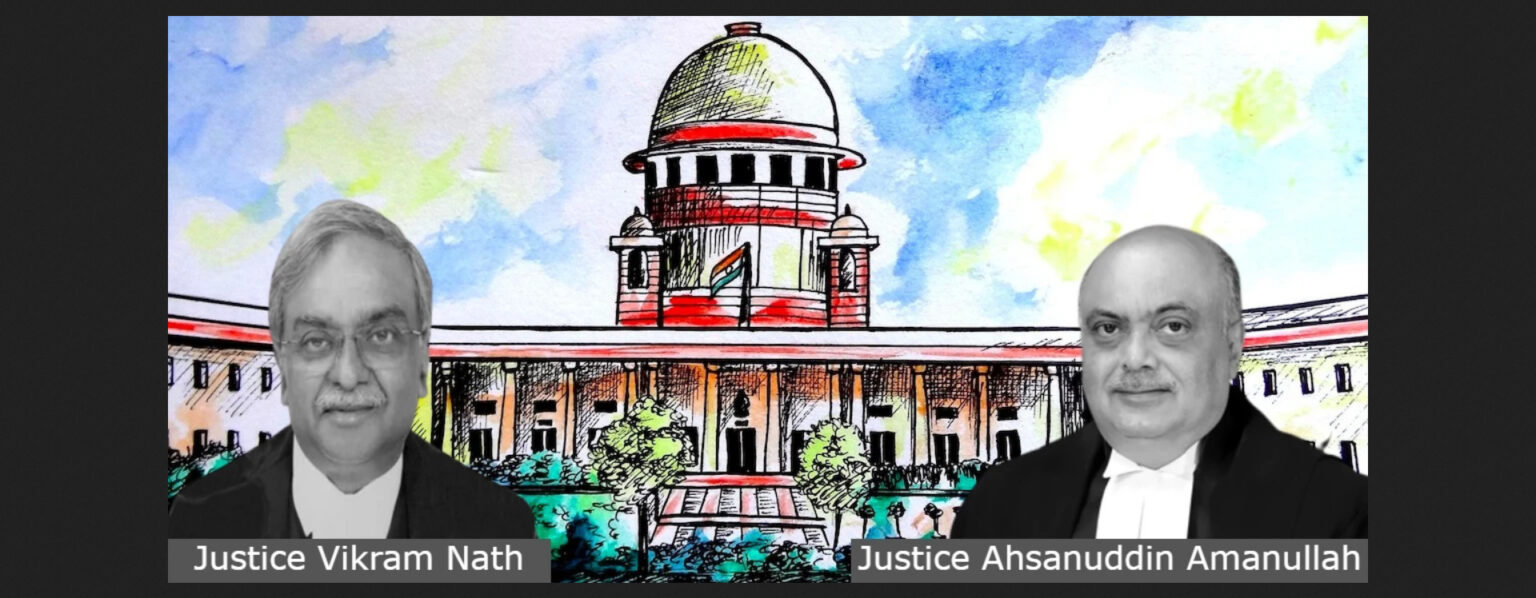In a unanimous decision, the Supreme Court bench comprising Justices Vikram Nath and Ahsanuddin Amanullah meticulously examined the intricacies of the case involving Suresh Thipmppa Shetty and Sadashiv Seena Salian, who were convicted by a Trial Court for their alleged involvement in a murder conspiracy. The duo’s subsequent appeals were dismissed by the Bombay High Court, leading to their appeal before the apex court.
Presumption of Innocence: A Cornerstone of Justice Supreme Court
The court’s ruling underscores the cornerstone of justice: the presumption of innocence. This fundamental human right, which acts as a bulwark against arbitrary and wrongful convictions, demands that an accused be treated as innocent until proven guilty beyond reasonable doubt. The court aptly recognized that this principle is not a mere formality but rather a pillar that upholds the essence of a fair trial and safeguards individual liberty.

Prosecution’s Burden: Beyond Reasonable Doubt
The apex court astutely reiterated the burden on the prosecution to establish its case beyond reasonable doubt. This requirement, deeply embedded in the jurisprudence of criminal law, serves as a safeguard against miscarriages of justice. The court held that this burden is not a hollow obligation; it is a constitutional imperative emanating from Articles 21 and 14 of the Indian Constitution, which enshrine the right to life and personal liberty and the guarantee of equality before the law.
The Role of Judicial Discretion
The court’s decision highlights the importance of judicial discretion in cases where doubt clouds the prosecution’s narrative. Drawing upon a judicious balance between the prosecution and the defense, the court avowed its commitment to lean in favor of the defense when confronted with reasonable doubt about the prosecution’s version. This stance stems from an understanding that the consequences of a wrongful conviction are grave, infringing upon an individual’s precious right to liberty.
Facts of the Case :- Supreme Court {Matter in dispute}
In the case at hand, Suresh Thipmppa Shetty and Sadashiv Seena Salian were accused of conspiring to abduct and murder Mahendra Pratap Singh. However, the court noted that the prosecution’s story fell short when the main conspirators, as per the prosecution, were acquitted. With the absence of direct evidence tying the appellants to the crime scene or attributing a specific role to them, the court found their convictions untenable.
Upholding Justice: Supreme Court’s Verdict
The Supreme Court’s verdict eloquently underscores its commitment to justice and the preservation of individual rights. By acknowledging that life and liberty are not to be trifled with, the court encapsulated the essence of its responsibility in upholding the tenets of justice. The ruling reinforces the principle that a conviction cannot stand in the face of reasonable doubt, and the prosecution must demonstrate its case beyond a shadow of a doubt.
Constitutional Foundations
The ruling also reiterates the strong constitutional foundations upon which these principles rest. The presumption of innocence and the requirement of proving guilt beyond reasonable doubt are not mere legal formalities but profound protections rooted in the Constitution. While certain offenses might entail a reverse burden of proof on the accused, this ruling underscores that the core principle of “innocent until proven guilty” remains sacrosanct for a wide array of criminal offenses.
Conclusion
In sum, the Supreme Court’s verdict in the 1995 murder case involving Suresh Thipmppa Shetty and Sadashiv Seena Salian is a testament to the judiciary’s commitment to upholding fundamental rights and ensuring a just and fair trial. The court’s emphasis on the presumption of innocence and the prosecution’s burden to prove guilt beyond reasonable doubt reaffirms the rule of law and protects individuals from arbitrary deprivation of their liberty. As society evolves, this ruling serves as a beacon, reminding us that justice remains the bedrock upon which our legal system stands.













